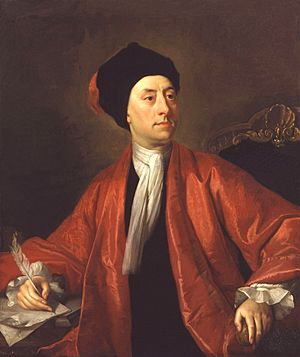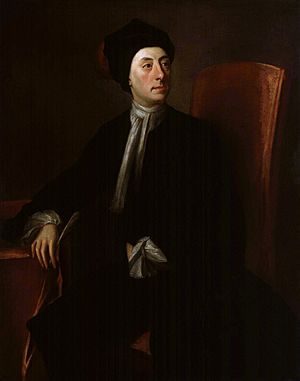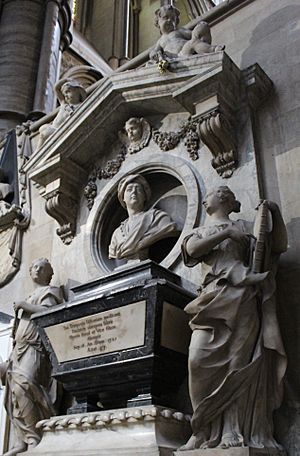Matthew Prior facts for kids

Matthew Prior (born July 21, 1664 – died September 18, 1721) was a famous English poet and a skilled diplomat. He also wrote for a newspaper called The Examiner.
Contents
Matthew Prior's Early Life and Education
Prior was likely born in Middlesex, England. His father was a joiner, which is someone who builds things with wood. When his father passed away, young Matthew left school. His uncle, who owned a wine shop, took care of him.
One day, a nobleman named Lord Dorset found Matthew reading a book by the Roman poet Horace. Lord Dorset was so impressed that he asked Matthew to translate a poem. Matthew did such a good job that Lord Dorset offered to help pay for his education.
Matthew went to Westminster School, a famous school in London. One of his friends there was Charles Montagu, 1st Earl of Halifax. To stay with his friend, Prior chose to accept a scholarship to St John's College, Cambridge. He earned his first degree in 1686 and became a fellow (a senior member of the college) two years later. In 1687, he and Montagu wrote a funny poem called City Mouse and Country Mouse. It made fun of another famous poet, John Dryden.
Beginning a Career in Diplomacy

In Prior's time, writers who used satire (making fun of things to show their flaws) often got help from powerful people. Matthew Prior's friend, Charles Montagu, quickly got a promotion. Three years later, Prior became a secretary for the English embassy in the Hague.
After four years, he was given a special job at court called a Gentleman of the Bedchamber. He also worked as one of the King's secretaries. In 1697, he was a secretary for the diplomats who signed the Peace of Ryswick. This was an important peace treaty.
Some people, like the poet Alexander Pope, doubted Prior's skills in diplomacy. However, King William would not have given him such important work if he wasn't good at it. This shows Prior was a skilled diplomat.
Prior's Work in France
Prior was very good at French. Because of this, he was sent to Paris the next year with the English ambassador. During this time, Prior said he had "business enough upon his hands." He felt he was "only a poet by accident."
Even so, he still wrote poems sometimes to help his career. Some of his poems from this period include:
- A sad poem about Queen Mary in 1695.
- A funny version of a poem by Boileau in 1695.
- Lines about King William escaping an assassination attempt in 1696.
- A short piece called The Secretary.
Return to England and Political Roles
After returning from France, Prior became an under-secretary of state. He also took over from John Locke as a commissioner of trade. In 1701, he became a member of Parliament for East Grinstead.
Prior was involved in secret talks about the Partition Treaty. But when other leaders were questioned about their part in it, Prior voted with the Tory side. When Queen Anne became queen, he joined forces with Robert Harley.
For nine years, Prior's name was not mentioned in public affairs. But when the Tories came back into power in 1710, Prior's diplomatic skills were needed again. Until Queen Anne's death, he played a big part in talks with the French court. Sometimes he was a secret agent, sometimes an ambassador's helper, and sometimes a full ambassador.
He helped negotiate the Treaty of Utrecht. This treaty was so linked to him that people sometimes called it "Matt's Peace." Prior also wrote for The Examiner newspaper during this time.
Later Life and Legacy
When Queen Anne died, the Whigs (another political party) took power. Robert Walpole accused Prior of wrongdoing, and Prior was held in prison from 1715 to 1717.
In 1709, Prior had already published a collection of his poems. While in prison, he wrote his longest funny poem, Alma; or, The Progress of the Mind. This poem, along with his most important work, Solomon, and other Poems on several Occasions, was published in 1718. He earned a lot of money from these books, which helped him live comfortably.
Matthew Prior died at Wimpole, a country estate in Cambridgeshire. He was buried in Westminster Abbey, a very famous church in London where many important people are laid to rest. A monument to Prior, created by John Michael Rysbrack, stands in Poets' Corner of the Abbey.
Prior's poems are known for being varied, well-written, and showing his knowledge. His longer works like Solomon are not his best. But Alma is a funny and clever poem. Prior was also very good at writing short, witty poems called epigrams.
Many of his love songs are not as strong. However, his playful poems, like To a Child of Quality, are still very popular. The famous writer William Makepeace Thackeray said Prior's poems were "amongst the easiest, the richest, the most charmingly humorous of English lyrical poems." He compared Prior to the Roman poet Horace.
Wittenham Clumps in Oxfordshire is believed to be where Prior wrote his poem Henry and Emma. A plaque there remembers this. Other poets, like Everett James Ellis, have said Prior was a big influence on their work.
See also
 In Spanish: Matthew Prior para niños
In Spanish: Matthew Prior para niños
 | William M. Jackson |
 | Juan E. Gilbert |
 | Neil deGrasse Tyson |


